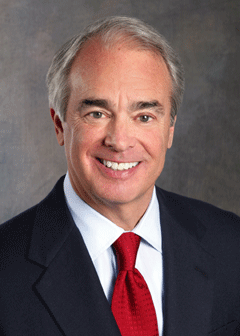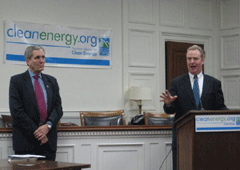Political Will and the Climate Change Bill
Air Date: Week of March 13, 2009

Senator Claire McCaskill (Courtesy of the U.S. Senate)
Congress is girding for a bruising political battle over global warming. But the toughest fight might not be between Democrats and Republicans but rather between Democrats and Democrats. Living on Earth's Jeff Young tells us why some centrist Democrats from the heartland have problems with President Obama's call for action on climate change.
Transcript
GELLERMAN: Well, as good as it may sound, Cap and Trade is far from a done deal. President Obama proposes but Congress may not feel disposed - especially moderate Democrats from heartland states, who are cool to action on global warming that could harm industries in their districts.
Living on Earth’s Washington correspondent Jeff Young is keeping tabs on the political climate for a climate change bill - and has our report.
YOUNG: California Democrat Henry Waxman put the environment at the center of his 35 years in Congress. Now as chair of the powerful House Energy committee Waxman is at the center of efforts on the planet’s biggest environmental threat. He’ll push a strong cap and trade bill on climate change through his diverse and sometimes fractious committee.
WAXMAN: Our committee is an interesting committee. Our committee represents the whole House. A bill that will emerge from our committee is a bill that I think can pass the House and may well be a model for the Senate, but don’t tell them I said that, [laughter] ‘cause they’ll want to do their own bill. And that’s fine, too.
YOUNG: The founding fathers devised the Senate as the “cooling saucer” in lawmaking, and that’s where a global warming bill might get the chilliest reception.

Senator Claire McCaskill (Courtesy of the U.S. Senate)
Yes, Waxman has some strong allies in the Senate eager to tackle climate change, and many will likely introduce bills of their own. But a list of those supporters reads like a trip along the country’s coasts. What’s missing is a big chunk of the heartland. Geography, not party, determines a Senator’s stance on energy. And a bloc of centrist democrats from the industrial Midwest and coal-dependent south could well hold the key.
[HALLWAY SOUNDS]
YOUNG: Last month, on the night President Obama called on Congress to cap carbon emissions, I sought out the Senators known as the “gang of 15”. Some of them sent a letter last year to Democratic leaders laying out reasons they could not support climate change legislation. And the group has grown. They’re people like Senator Mark Warner of Virginia.
WARNER: I support dealing with climate change. You know the devil is going to be in the details.
YOUNG: And Senator Claire McCaskill of Missouri.
MCASKILL: Yes of course I want to support a climate change bill but the devil is in the details.
YOUNG: And Sen. Kent Conrad of North Dakota who says, you guessed it:
CONRAD: Uh, devil’s in the details.
YOUNG: What are those devilish details? They boil down to two main points: competition from China, and energy from coal. In Missouri, about 80 percent of the electricity comes from coal, the most carbon heavy fossil fuel. Missouri Senator McCaskill fears dramatic rate increases if power plants aren’t allowed time to reduce carbon emissions.

(Courtesy of Duke Energy)
YOUNG: But carbon capture might be a decade away. Does that mean we wait a decade before we address climate change? Scientists tell us we don’t have that much time.
MCCASKILL: Oh no, we have to address climate immediately and we will. I just think we’ve got to find that sometimes elusive middle ground.
YOUNG: There are widely varying economic analyses of what a cap and trade bill might mean for energy costs. McCaskill’s concern about rates doubling or tripling is far higher than what most economists project. Senator Evan Bayh represents another coal dependent state, Indiana. He worries about additional costs for businesses already suffering from the economic downturn and foreign competition.
BAYH: If we’re going to really bite the bullet here and make progress as I believe we must, we’ve got to find a way to get China and India and the other rapidly developing countries involved. Because to ask the American people to sacrifice and then have that sacrifice go for naught is not the outcome we need.
YOUNG: The senators have a lot to think about, and an army of lobbyists is there to help.
The nonpartisan think tank Center for Public Integrity found more than 2300 lobbyists working on the issue. That’s four lobbyists for every member of Congress, and most work for fossil fuel industries.

Rep. Lloyd Dogget at a press event supporting 100 percent auctioning of carbon credits. (Courtesy of the Southern Alliance for Clean Energy)
ROGERS: I can support cap and trade. I can support 80 percent reductions by 2050 but what I need changed, and what the 25 states where more than 50 percent of electricity comes from coal need changed, is how we do the transition period.
YOUNG: Rogers says the government should give a portion of the carbon permits to companies like his at first, then require them to be purchased over time. That would allow time to either develop technology to capture emissions or use cleaner fuels.
But many economists say giving away carbon permits is like giving away money, and makes little sense. Obama’s budget director Peter Orszag made that case in hearings on the hill and pressed lawmakers to auction off 100 percent of the permits. He made a believer of Texas Democratic Representative Lloyd Doggett.
DOGGET: Dr. Orszag told me that to give away allowances would quote ‘represent the largest corporate welfare program that has ever been enacted in the history of the United States’ And on this question of whether or not we ought to give pollute-free cards to polluters, I’ve reached the conclusion that they ought not to get any, that this ought to be a 100 percent auction of the right to pollute or allowances.
YOUNG: But how to do that while winning over his party’s moderates? That’s another of those details Democrats could have a devil of a time sorting out. For Living on Earth, I’m Jeff Young in Washington.
Links
Statement by economists supporting 100% auction of carbon permits
Duke Energy’s perspective on allocation of carbon permits
Center for Public integrity study of lobbyists working on climate change
Living on Earth wants to hear from you!
Living on Earth
62 Calef Highway, Suite 212
Lee, NH 03861
Telephone: 617-287-4121
E-mail: comments@loe.org
Newsletter [Click here]
Donate to Living on Earth!
Living on Earth is an independent media program and relies entirely on contributions from listeners and institutions supporting public service. Please donate now to preserve an independent environmental voice.
NewsletterLiving on Earth offers a weekly delivery of the show's rundown to your mailbox. Sign up for our newsletter today!
 Sailors For The Sea: Be the change you want to sea.
Sailors For The Sea: Be the change you want to sea.
 The Grantham Foundation for the Protection of the Environment: Committed to protecting and improving the health of the global environment.
The Grantham Foundation for the Protection of the Environment: Committed to protecting and improving the health of the global environment.
 Contribute to Living on Earth and receive, as our gift to you, an archival print of one of Mark Seth Lender's extraordinary wildlife photographs. Follow the link to see Mark's current collection of photographs.
Contribute to Living on Earth and receive, as our gift to you, an archival print of one of Mark Seth Lender's extraordinary wildlife photographs. Follow the link to see Mark's current collection of photographs.
 Buy a signed copy of Mark Seth Lender's book Smeagull the Seagull & support Living on Earth
Buy a signed copy of Mark Seth Lender's book Smeagull the Seagull & support Living on Earth

